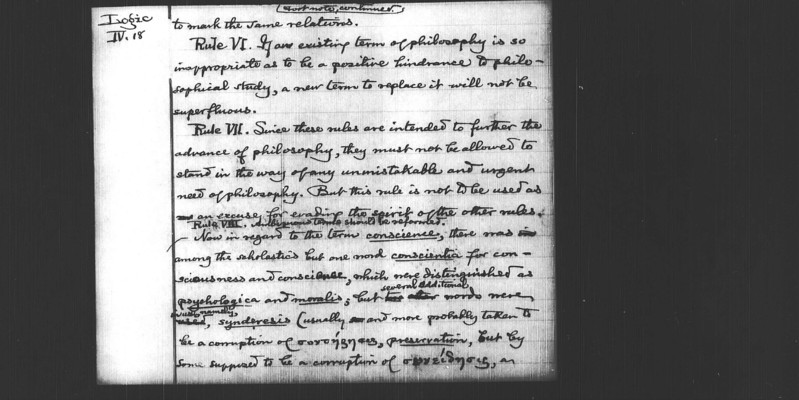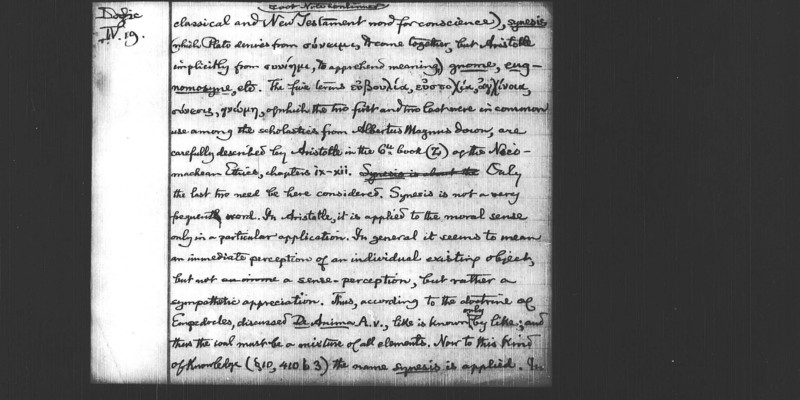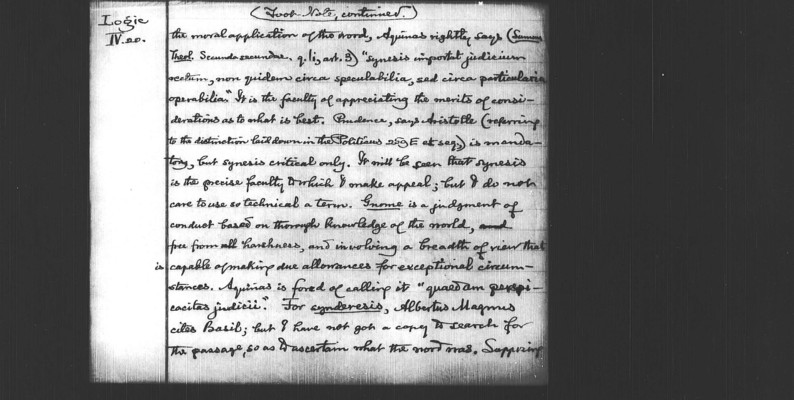Pages
6
Logic IV. 17 footnote continued adequare definitions should be acknowledged as terms of philosophy with those definitions. But terms substantially superfluous are not to be acknowledged.
Rule III. To use as a term in philosophy in one sens as expression which is a term of philosophy in a conflicting sense should be stigmatized as wrong doings. In order formally to convey a meaning which belongs to a term of philosophy it will be best to use that term.
Rule IV. When a conception of philosoply is generalized a philosophical term signifying it and consisting of a single work may be corresponding generalized a limiting word being provided to mark the old conception. But this proceeding is only justifies in case it is conducive to the advance of philosophy. Rule V. A system of terms marking the relations of a system of old conceptions is not superfluous in case no ther such system exists
7
Logic IV. 18 footnote continued
to mate the same relations.
Rule VI. [Gave?] existing term of philosophy is so inappropriate as to be a positive hinderance to philosophical such a new term to replace it will not be superfluous. Rule VII. Since these rules are intended to further the advance of philosophy they must not be allowed to stand in the way of any unmistakable and urgent need of philosophy. But this rule is not to be used as an axcuse for evading the spirit of the other rules. Rule VIII. Ambiguous terms should be reformed. Now in regard to the term conscience there was among the scholastic but one word conscientia for consciousness and [consciouse?] which were distiguished as psychologica and moralis but several additional words were in use namely synderesis (usually and more probably taken to be a corruption of [?] preservation but by some supposed to be a corruption of [?] an
8
Logic IV. 19. foot note continued
classical and new Testament word for conscience) synesis (which Plato derives from [?] together but Aristotle implicitly from [?] to apprehend meaning) gnome, eugnomosyne, etc. The five terms [?][?][?][?][?] of which the two first and two last were in common use among the scholastics from Albertus magnus [?] are carefully descibed by Aristotle in the 6th book of the Nicomachean Ethico chapters ix-xii. Only the last two need be considered here. Synesis is not a very frequent work. In Aristotle it is applied to the moral sense only in a particular applicaton. In general it seems to mean an immediate perception of an individual existing object but not a sense-perception but rather a synopathetic appreciation. Thus according to the doctrine of [Empedocles?] discussed [DeAnima A.V.?] like is know only by like and thus the soul must be a mist of all elements. Now to this kind of knowledge (10, 410 b 3) the name synesis is applied. In
9
Logic IV. 20. (Foot Note continued) the moral application of the word, Aquinas rightly says [Summon Theal?]. [Secunda secundae?]. q. li, ab.3 "synesis importat judiciusn sectum nor guidem circa speculabilia sed circa particularia operabilia." It is the faculty of appreciating the merits of considerations as to what is best. Prudence says Aristitle 9referring to the distinction lad dwon in the Politics 25gE et seq.) is mandatory but synesis critical only. It will be seen that synesis is the preceise faculty to which I make appeal but I do not care to use so technical a term. Gnome is a judgement of conduct based on thorough knowledge of the world and free from harshness and involving a breadth of view that is capable of making due allowances for exceptional circumstances. Aquinas is forced of calling it "quaed am perepicacitas judicii." For synderesis Alberus Magmus cites Basil but I have not got a copy to search for the passage so as to ascertain what the word was. Supposing
10
Logic IV. 21 Foot note continued
that is was [?] preservation from [?] to guard the fundamental idea perhaps is to wrap up while with a short vowel [?] VTEP means to remove the surface the reference must be to the embers of conscience left in [Adorn?] after the fall and preserved alike in the breasts of all. It is oftencalled the judicatorium, in quo scrito est les naturalis. It appears to have been regards as an impulse toward the good and it is futher said to be the "morsus conscientine." Aquinas defines it as "lex intellctus nostri inquantum est habitus continens praecepta legis naturalix quae suns prima operum humanorum." (Summa theol. sec cec q xciv. art1.) Although Descartes was almost the last writer to use the word yet it is familiar enough to all students of ethics. There is nothing in the great doctors of scholasticism to warrant the statement and that it is merely the natural knowledge of the general laws and is correlated to the particular act. It is that habit of the soul from which word judgements spring. Conscientia among the scholastics




